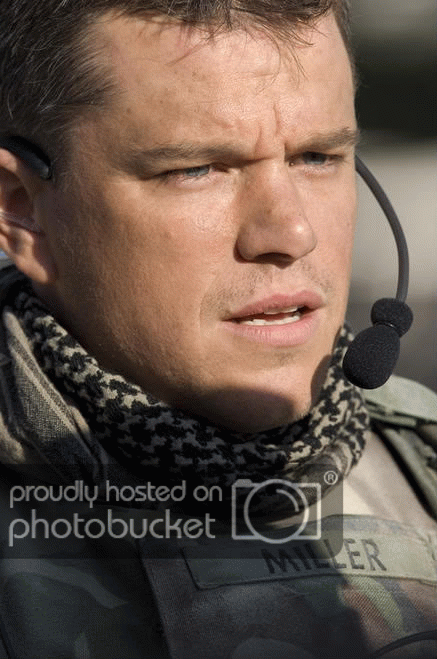(source)
Green Zone is a war film with a message, one that is most certainly not about the honors or glories of war but rather the reasons and justifications for war that might be manufactured to create support for invasions or conflicts. As more and more members of the press and politicians push their dogmatic views on the Iraq War into the public, it's important for films like Green Zone to be produced.
Directed by Paul Greengrass and inspired by Rajiv Chandrasekaran's Imperial Life in the Emerald City, the story revolves around Chief Roy Miller (Matt Damon) whose role in Iraq is to lead missions to find the weapons of mass destruction (WMD) that were touted as the justification for going to war. After following intelligence reports multiple times that lead to empty sites with no WMD at all, Miller makes the choice to raise the issue at a briefing.
In a scene featuring Paul Rieckhoff, Iraq War veteran and executive director and founder of Iraq and Afghanistan Veterans of America (IAVA), Miller explains to other soldiers how he believes the intelligence is flawed. Of course, he is told it is not his job to discern whether the intelligence is faulty or not; he is simply to follow orders and carry out missions as they are handed down.
Miller's curiosity and urge for the truth drives him from this point on. A key turning point comes when he happens upon an Iraqi, "Freddy," who has information he wishes to give to U.S. soldiers. Freddy discloses to Miller that there is a meeting with Baathist generals who used to serve Saddam. Miller chooses to follow this information and go somewhere where he is certain he might find answers to why he is in Iraq fighting a war.
Freddy, who becomes a translator for Miller, is possibly one of the most dynamic portrayals of an Iraqi in the history of American cinema. The conflict that Freddy faces--whether to help and allow U.S. soldiers to set the agenda for his country or not--is presented in a profound way. Freddy's character gets to the core issue that trumps all discussion of why America went to war in Iraq; it gets at the fact that America may not have a right to stay and finish "liberating" Iraq even if its leaders admit to manufacturing consent for invading Iraq.
This film stands in contrast to Hurt Locker, a recent Academy Award-winning film that depicted what the war has been like for soldiers in Iraq. Green Zone's story is less about the human experience of the soldiers. The shots do not hang on the faces of individuals who are trying to come to grips with feelings of anguish, anxiety, fear, exhaustion, and pain.
The aesthetics do not allow us to get inside the minds of the U.S. soldiers fighting. Instead, the story brings attention to the power politics, internal politics between the CIA and the Pentagon, the press' role in the war, the Green Zone officials' disconnect with the nation of Iraq which the officials are claiming to liberate, etc.
(Note: You can view every article as one long page if you sign up as an Advocate Member, or higher).






